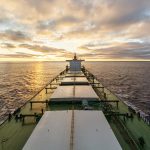The Liberia International Ship and Corporate Registry (LISCR) recently held its annual training seminar in South Korea at the Commodore Hotel in Busan.
The agenda for this event covered a wide variety of topics, including LNG, alternative fuels, Port State Control compliance, IMO regulatory framework, decarbonisation, and joint industry projects (JIP).
“The IMO regulatory framework, opportunities for innovation, and our participation in JIPs and Joint Development Projects. Our interactions with the Korean shipbuilders, classification societies and other key stakeholders are key drivers for our industry’s joint pursuit to decarbonise international shipping in line with IMO’s initial GHG emission reduction strategy,” said Thomas Klenum.
“Our goal is to help develop and approve new optimised, competitive, and environmentally friendly ship designs for the future, which will also benefit our global environment and climate, ” he added.
The seminar was attended by over 80 maritime professionals from various segments of the shipping industry, including: shipowners, management companies, class societies, equipment manufactures, and shipyards. The speakers included: Thomas Klenum, LISCR’s Executive Vice President of Innovation and Regulatory Affairs; Dallas Smith, LISCR’s Head of LNG and Alternative Fuels; and J. S. Kim, the Managing Director of LISCR Korea.
Smith, from LISCR headquarters said, “It was great to finally get in front of the professionals from the shipping industry in South Korea and discuss the ongoing decarbonization challenges. We are going to have to work together as a whole to ensure we can have a smooth transition industry to a zero-emission sustainable future. The Liberian Registry is always looking for new opportunities to work with our partners to help remove barriers to approving new technologies, innovative design features and alternative fuels.”
This type of partnership is the key reason the Liberian Registry is leading the way to decarbonisation. They currently have issued over 30 AIPs for JIPs, have the most deep-drafted dual-fuelled vessel on the water, and over 28% of the market share of ordered newbuild LNG Carriers.
Source: Seatrade Maritime News






